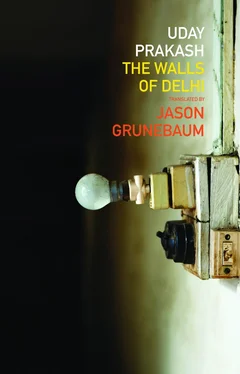(in English)
Everything is looted, spoiled, despoiled,
Death flickering his black wing,
Anguish, hunger — then why this lightness overlaying everything…
(in Hindi)
I am trying to remember who these lines belong to. Are they
Anna Akhmatova’s?
From page thirty-two:
They’ve erased all my words from everywhere, and now I have died, absolutely died, my huge huge head, with its pain inside that can’t be cured, bullet marks and blood stains all around, and everywhere people are eating, people are laughing, didn’t they get the gruesome news, or are they part of the crime? They’re counting the money on camera and off and I am wondering whether my head is India that’s slowly dying…?
Shobha and Chandrakant didn’t really understand the writings of their sick child, Suryakant. The two of them couldn’t read and write very well, and didn’t know English at all. They only spoke Hindi and Marathi, and lived a very meek existence. Chandrakant once said to me, ‘You’ve definitely left your mark on Suri. He’s always reading your books, and he’s always marking up the pages.’
Shobha told me in tears that just about a week ago he said that there was something he had read in one of uncle’s books he wanted to come over and ask about.
But I’ll never find out what it was in which book of mine he wanted to find out about. He died before he could ask.
It was the death that for the past six years everyone had feared might happen at any moment. Suryakant had fought mightily on his own behalf to stay alive and stave death off.
Every night Suri held back the clock hands of the time bomb in his head, buying himself a day or two more. He was unwavering in his efforts. It was a desire to live shared by tens of millions of others who suffer injustice and live inordinately difficult lives.
But one day Suri decided he was done and gave up.
How? Why? This is what Chandrakant and Shobha told me as we were coming back from Nigambodh Ghat, where Suri’s last rites were performed. A HAWKER, SUN ON THE ROOF TOP, THE PRESSURE COOKER’S WHISTLE THAT WHISTLES AND WHISTLES, AND A CHINESE CAP GUN
The date was 25 December, 2004.
The high temperature in Delhi on that day was sixteen degrees centigrade, and the low was three point four.
Even at nine thirty in the morning, fog was so thick that that there still was no trace of the sun. Cars on the road at eight still had their headlights on, and were crawling along like ants. Visibility was almost zero; you couldn’t see more than a few metres ahead.
Chandrakant, after waiting forty-five minutes outside with Amar for the Blue Bells bus that never came, returned home.
Suddenly around ten the fog lifted, and the bright, shining sun revealed itself. Shobha was making channa dhal in the pressure cooker that day. As soon as the sun came out, all the women who lived in the C-block apartment building scurried up to the rooftop. Shobha took her sewing machine and carpet and went to the roof, too — not the same carpet as the magic carpet from Jahangirpuri, but one she bought after they had moved to Ashok Vihar. She was up sewing until two-thirty the night before. She had been wearing glasses for the past five years. She had until three that day to finish sewing fabric for a store called Kalpana Boutique and Design Garments in Deep Market. With the deadline, she was stressed out and in a rush.
She spread out the rug and sat with her sewing machine. She was half listening for the sound of the steam whistle on the pressure cooker with the channa dhal she had put on. It could blow at any moment. She would count how many times the whistle blew, and run down and turn off the stove when it went off for the eighth time.
Suri and Amar were sitting with her on the rug. Suri was writing something in Amar’s notebook, and Amar was leaning over, watching quietly. That’s when Bimla Sahu, who was sitting just a little distance away, said, ‘Your oldest one has been spitting off the balcony and ripping up paper into little bits and throwing them off like confetti. Tell him to stop. I’ve also found peanut shells and candy wrappers outside my door a few times.’
Bimla Sahu had announced this deliberately loud enough so that all the other women sitting on the rooftop would hear.
Suri, who had been hunched over Amar’s notebook writing something, also listened. He lifted his giant head and said hoarsely, ‘That’s not true, Auntie! I’ve never thrown anything off the balcony. And I’ve definitely never spat off it. Do you really think I’m that uncouth and stupid?’
That was enough to make Bimla Sahu, who had such a sturdy frame the women of the Janta Flats called her ‘the wrestler’ or ‘toughie,’ turned several shades darker. Then she let loose.
‘Oh, look who’s using his big mouth! Everything I said you do — you know you do! You yellow cowardly little kid!’
Suri’s breathing quickened. ‘You’re lying, Auntie. And you don’t know how to do anything except make drama. When’s the last time you had your blood pressure checked?’
No sooner had he said this than Bimla Sahu clanged down the thali from which she was picking out pebbles from the rice. She screamed and gestured with her hands, ‘Oh, are you gonna check my blood pressure? Why don’t you fix that jug of a head of yours first? You probably don’t even realize you’re drooling off the balcony. If you have to go out on the balcony, stand on the right side. D’you have to stand right over my head?’
Pain was written all over Suri’s face. His lips began to tremble and he was having difficulty breathing; all of this frightened Shobha. She hoped this wasn’t the start of one of Suri’s massive headaches. He was an extremely sensitive boy, and Bimla Sahu had really got to him.
Shobha made sure the other women could hear as she shot back. ‘Hey little miss tough stuff, why do you have to pick fights with little kids? If you need someone to fight with, don’t forget you can count on me!’
The emphasis she put on you can count on me, the title of a popular film those days, was so good that the women on the roof top broke into hysterics. The tide of laughter was so powerful that it swept up Amar and Suri, too.
And, finally, tough-stuff-wrestler Bimla Sahu herself wasn’t immune to its force. ‘Not bad. If Shah Rukh sees your moves he’ll cart you off to elope.’ She then returned to picking pebbles out of her rice.
Just then — it must have been five or six minutes after eleven — the shout of the street hawker came from below. The C-block apartment building was five stories tall. All of the apartments’ roofs were connected; Amar, along with the other kids, ran over to the railing.
Suri also lumbered over to the edge, with his heavy, misshapen head.
Pickle-pee! Pickle-pee! Pickle-pee! The street hawker played his little plastic flute below. A lengthy bamboo stick was tied vertically to the handlebars of his bike; fastened to the stick was a cardboard sheet at least four-feet- by-four-feet. All sorts of fabulous items hung from it: balloons, toys, assorted colours of plastic combs, lighters, scissors, berets, drawstrings for skirts, ribbons of rainbow colours, hair bands, hair brushes, little mirrors, bangles, and all sorts of other merchandise.
But at the very top of the board sat a row of Chinese cap guns. You could get them in any bazaar those days for fifteen rupees, and they were unbelievably popular with the kids of Delhi. Chinese goods were threatening to flood the marketplace — wondrous electronics at startlingly low prices. The Chinese cap gun shot little plastic coloured bullets, and as soon as you pulled the trigger, rat-a-tat, ping! ping! Utterly realistic. And if you aimed right, the plastic bullet would hit the target spot on.
Читать дальше










